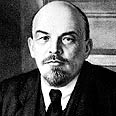
Lenin's Jewish roots confirmed
Newly released letter written by Lenin's eldest sister reveals their maternal grandfather was a Ukrainian Jew who converted to Christianity to escape Pale of Settlement, gain access to higher education
For the first time ever, ordinary Russians can now see documents that appear to confirm long-standing rumors that Vladimir Lenin had Jewish heritage.
In a country long plagued by anti-Semitism, such heritage can be a significant taint, especially for the founder of the Soviet Union who is still revered by many elderly Russians.
Among dozens of newly released documents on display at the State History Museum is a letter written by Lenin's eldest sister, Anna Ulyanova, saying that their maternal grandfather was a Ukrainian Jew who converted to Christianity to escape the Pale of Settlement and gain access to higher education.
"He came from a poor Jewish family and was, according to his baptismal certificate, the son of Moses Blank, a native of (the western Ukrainian city of) Zhitomir," Ulyanova wrote in a 1932 letter to Josef Stalin, who succeeded Lenin after his death in 1924.
"Vladimir Ilych had always thought of Jews highly," she wrote. "I am very sorry that the fact of our origin – which I had suspected before – was not known during his lifetime."
Under czarist rule, most Jews were allowed permanent residence only in a restricted area that became known as the Pale of Settlement which included much of present-day Lithuania, Belarus, Poland, Moldova, Ukraine and parts of western Russia.
Identified himself only as Russian
Many Jews joined the Bolsheviks to fight rampant anti-Semitism in czarist Russia and some were among the leaders of the Communist Party when it took power after the 1917 Revolution. Most prominent among them was Leon Trotsky, whose real name was Bronstein.
But Lenin, who was born Vladimir Ilych Ulyanov in 1870, identified himself only as Russian. He took Lenin as his nom de guerre in 1901 while in Siberian exile near the Lena River.
A brief period of promotion of Jewish culture that began under Lenin ended in the early 1930s when Stalin orchestrated anti-Semitic purges among Communists and hatched a plan to relocate all Soviet Jews to a region on the Chinese border.
Ulyanova asked Stalin to make Lenin's Jewish heritage known to counter the rise of anti-Semitism. "I hear that in recent years anti-Semitism has been growing stronger again, even among Communists," she wrote. "It would be wrong to hide the fact from the masses."
Stalin ignored the plea and ordered her to "keep absolute silence" about her letter, according to the exhibition's curator, Tatyana Koloskova.
Lenin's official biography, written by his niece Olga Ulyanova, said his family had only Russian, German and Swedish roots.
Letter's authenticity disputed
The letter from Lenin's sister became available to Russian historians in the early 1990s, but its authenticity was fiercely disputed. It was chosen for inclusion in the exhibit by Koloskova, who as director of the State History Museum's branch dedicated to Lenin is one of the most authoritative scholars on his life.
The exhibition in the museum on Red Square, near the mausoleum where Lenin's body still lies, also discloses that he was in such misery after suffering a stroke in 1922 that he asked Stalin to bring him poison.
"He did not incidentally pick Stalin to fulfill this request," Lenin's youngest sister, Maria Ulyanova, wrote in a 1922 diary entry. "He knew Comrade Stalin as a steadfast Bolshevik, straight and devoid of any sentimentality. Who else would dare to end Lenin's life?"
Initially, Stalin promised to help Lenin, but other Politburo members decided to turn down his request, the letter says. Trotsky, whom Stalin forced out of the Soviet Union, claimed in his memoirs that Stalin had poisoned Lenin.
The 111 documents on display, many of them only recently declassified and all of them open to the public for the first time, give surprising insights into top figures of the Soviet Union. Men usually portrayed as stern and fearless are seen as sometimes whimsical, frightened and even despairing.
The exhibition, which opened last week, runs through July 3.
- Follow Ynetnews on Facebook










